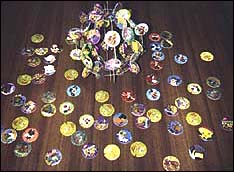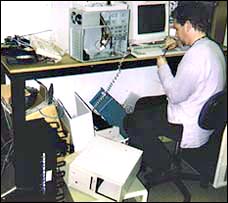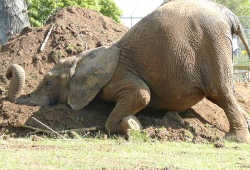Dorothy – 20/2/98
Are you a collector?
 |
| A private collection of over 100 ‘tazo’s’ found in ETA chip packets in New Zealand |
Your answer probably should be YES even though you declare, “I’m not a hoarder – I travel light and DO NOT collect things.” Most of us are collectors of treasures – those you can see and those you hoard within yourself. It’s a great interest, but for some of us it can become an addiction.
Collectors of people My father used to tell my mother that she was a great collector. That would be when she had invited a collection of different people she had met to come to our house and share a meal at the weekend.
Being editor of NZine I’ve become a collector of support people who put the material on the Internet, write articles, take photos, help me with research or give time for interviews.
Email friends Before the magic of email, collectors of penfriends used to have to wait for slow overseas mails to get replies to their letters. Now the speed of replies makes for immediacy in the communication, and interesting friendships, even marriages, result.. Some readers of NZine have written to me and it is fascinating to learn more about the range of people who read our articles.
Information hoarders Some of you are collectors of information. Maybe you enter for competitions like Mastermind which leave us stunned by the detailed knowledge the contestants possess. You may be a student collecting data about your research topics. Perhaps you are a collector of qualifications – a perennial student.
Genealogists hoard information about ancestors to build into a satisfying story. The New Zealand room at the local library has on the staff a specialist in genealogical research and there is a regular stream of people searching for information about their families.
Linguists Some collect languages. Ahmed Kafedzic from Bosnia, the subject of People Making Changes 2, could speak seven languages and has learnt English as the eighth. Our new immigrants and exchange students often have a range of languages they can speak.
Skills collectors I so envy the people I meet who command a range of skills:
- mechanically minded people who can repair a range of motors or appliances
- home handypersons who can build or renovate their own homes
- multi-skilled craftspeople
- musicians who play a range of different instruments
- computer buffs who are conversant with many types of software
- cooks who can produce meals in many ethnic styles
- sportspeople who excel in more than one sport like Jeff Wilson, All Black and New Zealand rep cricketer
- athletes who develop competitive skills… I watch with awe as they compete in a triathlon, pentathlon or even a decathlon
“You never know when it may come in handy.” That fatal phrase fills our shelves and our cupboards and above all our sheds. We women keep clothes we like even when they are too tight because one day we may be slimmer and able to wear them again. People who sew keep boxes of fabric and odd buttons and braids because “You never know when they may come in handy.”
 |
This applies equally to computer equipment and electronic hardware. In an industry that is continually bringing out faster and smaller versions, the desire to keep up with upgrades can leave you with equipment which is old but functional and many people like to fiddle with and reuse electronic bits and pieces. Besides, if you can’t reuse them now, “you never know when they may come in handy”.
Men hoard their treasures in their sheds. Kiwi men are so prone to this type of hoarding that Jim Hopkins, well-known New Zealand broadcaster and television personality, has written a new book, “Blokes and Sheds”. It is being published by Harper Collins and is due to appear mid-year. Jim says, “The book reveals spectacular secrets of the shed and the many and various wonders within.” There’ll be more on this in NZine when the book appears. Watch for it.
Tangible collections – space a problem? Pens, beer mats or labels, phone cards, jokes, quotations, stamps and postmarks, gemstones, coins, salt and pepper shakers, small snuff bottles, jewellery, small shells, recipes and autographs have the advantage of taking up comparatively little space – if your collection is small.
However, imagine housing 424,868 different beer labels, the world record held by Jan Solberg of Oslo, Norway, according to the Guinness Book of Records. If you collect beer cans the storage problem is worse, and 292 disused parking meters, the collection of Lotta Sjolin of Solna, Sweden, must require a museum of their own. 13.900 pepper shakers, collected since 1946 by Ruth Tasmussen of Traer, Iowa, USA are stored in two buildings.
Book and comics need a library to shelve them, dolls need display cases, collections of value need special security.
Is collecting the privilege only of the wealthy? NO. Anyone can start a collection, but it is best to look at prices and storage first.
Most of us can remember the collections of our childhood. People giving Christmas or birthday presents are delighted to find children collecting Thomas the Tank Engine extras, books by a favourite author, match box toys, or special dolls.
Often collecting can become a family interest, with adults bringing home bottle tops, packets, stickers or autographs to help swell the collection.
So why do we collect? Is it the challenge, the thrill of the search, the contacts, or the extra interest collecting gives to reading, to outings and to travel? Could you stop today or are you addicted?
Use our backchat facility and tell us about what collections have meant to you.




